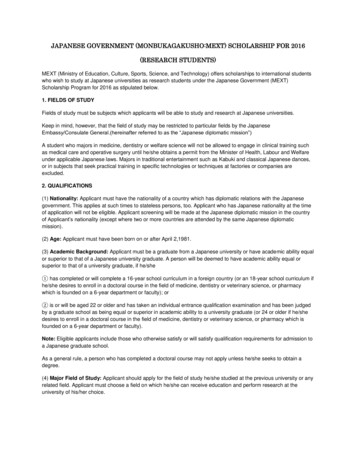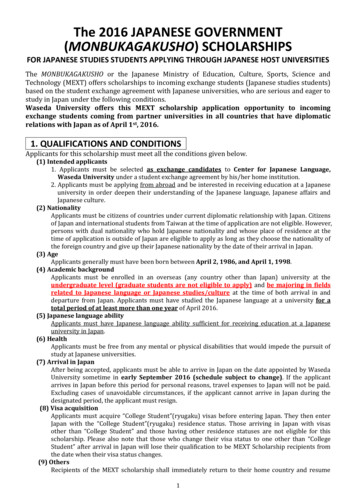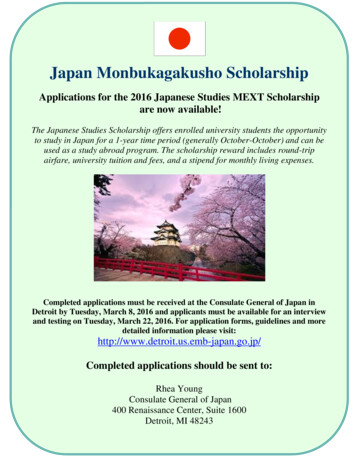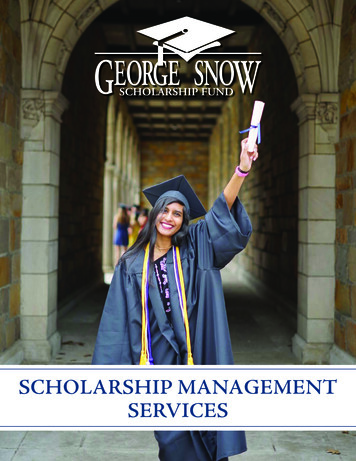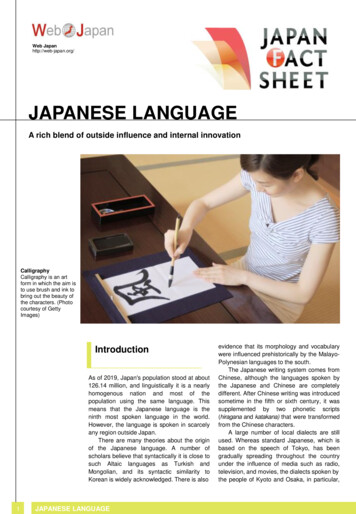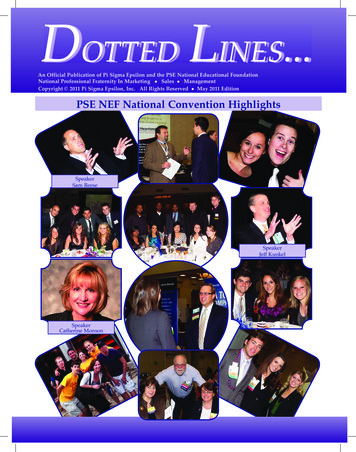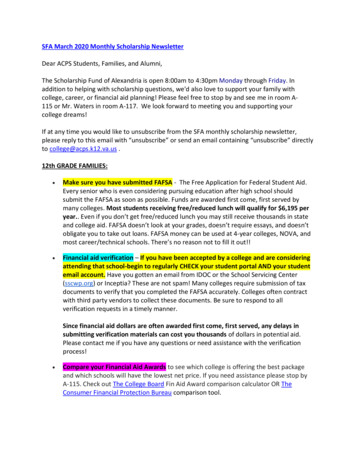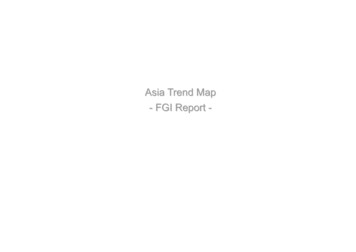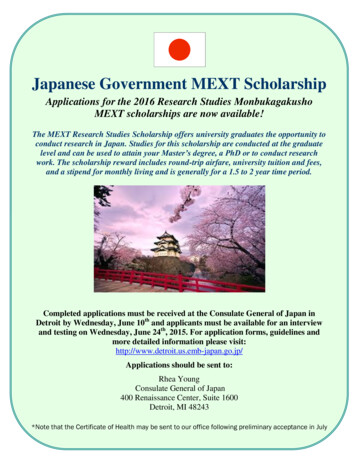
Transcription
Japanese Government MEXT ScholarshipApplications for the 2016 Research Studies MonbukagakushoMEXT scholarships are now available!The MEXT Research Studies Scholarship offers university graduates the opportunity toconduct research in Japan. Studies for this scholarship are conducted at the graduatelevel and can be used to attain your Master’s degree, a PhD or to conduct researchwork. The scholarship reward includes round-trip airfare, university tuition and fees,and a stipend for monthly living and is generally for a 1.5 to 2 year time period.Completed applications must be received at the Consulate General of Japan inDetroit by Wednesday, June 10th and applicants must be available for an interviewand testing on Wednesday, June 24th, 2015. For application forms, guidelines andmore detailed information please ations should be sent to:Rhea YoungConsulate General of Japan400 Renaissance Center, Suite 1600Detroit, MI 48243*Note that the Certificate of Health may be sent to our office following preliminary acceptance in July
APPLICATION GUIDELINESJAPANESE GOVERNMENT (MONBUKAGAKUSHO:MEXT) SCHOLARSHIP FOR 2016(RESEARCH STUDENTS)The Ministry of Education, Culture, Sports, Science and Technology (MEXT) offers scholarships to internationalstudents who wish to study in graduate courses at Japanese universities either as a (non-degree) student or aregular student seeking a degree under the Japanese Government (MEXT) Scholarship Program for 2016 as follows.1. FIELDS OF STUDYApplicants should apply for the field of study they majored in at university or its related field. Moreover, thefields of study must be subjects which applicants will be able to study and research in graduate courses at Japaneseuniversities.The fields of study may be restricted to particular fields by the Japanese Embassy/Consulate General(hereinafter referred to as the “Japanese diplomatic mission”) in the applicant’s country.A student who studies medicine, dentistry or welfare science will not be allowed to engage in clinical trainingsuch as medical care and operative surgery until he/she obtains a relevant license from the Minister of Health,Labor and Welfare under applicable Japanese laws. Those studying traditional entertainment arts such as Kabukiand classical Japanese dances, or subjects that require practical training in specific technologies or techniques atfactories or companies are excluded from this restriction.2. QUALIFICATIONS AND CONDITIONThe Ministry of Education, Culture, Sports, Science and Technology (MEXT) is now accepting applications fromoverseas students for study in Japan. Our aim is to foster human resources who will become bridges of friendshipbetween your country and Japan through study in Japan and who will contribute to the development of bothcountries and the wider world.(1) Nationality: Applicants must have the nationality of a country that has diplomatic relations with Japan.Applicants with no official nationality are also eligible to apply. An applicant who has Japanesenationality at the time of application is not eligible. However, persons with dual nationality whohold Japanese nationality and whose place of residence at the time of application is outside ofJapan are eligible to apply as long as they choose the nationality of the foreign country and giveup their Japanese nationality by the date of their arrival in Japan. Applicant screening will beconducted at the Japanese diplomatic mission in the country of applicant’s nationality.(2) Age: Applicants generally must have been born on or after April 2, 1981.(3) Academic Background: Applicants must be a graduate from a Japanese university or have academic abilityequal or superior to that of a Japanese university graduate. A person will be deemedto have academic ability equal or superior to that of a university graduate, if he/she:① has completed or will complete 16 years of school education in a foreign country (or 18 years of schooleducation if he/she desires to enroll in a doctoral course in the field of medicine, dentistry or veterinaryscience, or pharmacy which is based on a 6-year course in a department or faculty); or② is or will be aged 22 or older and has taken an individual entrance qualification examination and has beenjudged by a Japanese graduate school as being equal or superior in academic ability to a universitygraduate (or 24 or older if he/she desires to enroll in a doctoral course in the field of medicine, dentistry orveterinary science, or pharmacy which is based on a 6-year course in a department or faculty). Eligibleapplicants include those who otherwise satisfy or will satisfy qualification requirements for admission to aJapanese graduate school. As a general rule, a person who has completed a doctoral course may not applyunless he/she seeks to obtain a degree.(4) Japanese Language Ability: Applicants must be willing to learn Japanese. Applicants must be interested inJapan and be willing to deepen their understanding of Japan after arriving inJapan. Applicants must also have the ability to do research and adapt to livingin Japan.(5) Health: Applicants must be free from any mental or physical disabilities that would impede the pursuit ofstudy at Japanese graduate school.(6) Arrival in Japan: In principle, applicants must be able to arrive in Japan between the 1st and 7th of April2016, or by the date specified by the accepting university, which will fall within two weeksof the starting date for each semester (in general, in September or October) in that yeardesignated by the accepting university.1
(7) Visa Requirement: Applicants must acquire College Student (ryugaku) visas before entering Japan. Theythen enter Japan with the College Student (ryugaku) residence status. Please also notethat those who change their visa status to one other than College Student after arrival inJapan will lose their qualification to be Japanese Government Scholarship recipients fromthe date when their visa status changes.(8) Others: After returning to the home country, former scholarship recipients shall maintain close contact withthe university where they studied, cooperate with the conducting of post-return surveyquestionnaires, participate in events conducted by Japanese diplomatic missions in their country,and work to improve relations between the home country and Japan.(9) Any applicant who meets any or all of the following conditions is ineligible. If identified after the start of thescholarship period, the applicant will be required to withdraw from the scholarship.① Those who are military personnel or military civilian employees at the time of their arrival in Japan;② Those who cannot arrive in Japan during the period designated by MEXT or the accepting university;③ An applicant who is a previous recipient of a Japanese government scholarship, but does not haveeducational research experience exceeding more than three years from the first day of the month followingthe final payment of the previous scholarship to the beginning of the payment of this scholarship, as of April1, 2015. This does not apply to the past recipients of Japanese studies scholarships and Japan-Korea JointGovernment Scholarship Program For The Students In Science And Engineering Departments who havegraduated or are going to graduate from universities in their home countries and past participants in theYoung Leaders Program;④ Those who are currently enrolled at a Japanese university with a College Student (ryugaku) residencestatus; those enrolled, or scheduled to be enrolled, at a Japanese university as a privately financedinternational student during the period when the scholarship application was filed in the home country untilprior to the start of the provision of the scholarship; This does not apply to current self-financedinternational students at Japanese universities who will complete their courses of study and return to theircountries before the end of the current fiscal year;⑤ Recipients of scholarships from institutions other than MEXT (including government institutions in theirhome countries) that overlap with the Japanese Government Scholarship (Prospective beneficiaries areincluded);⑥ Applicants who are expected to graduate at the time of application and cannot satisfy the qualifications andthe conditions related to academic background by the deadline given;⑦ Holders of dual nationality at the time of application who cannot verify that they will give up Japanesenationality by the time of the arrival in Japan; or⑧ Applicants who wish, from the time of application, to conduct fieldwork or participate in an internshipoutside of Japan, since this scholarship program is intended for overseas students who wish to enroll in aJapanese university and do graduate research in Japan.3. PERIOD OF SCHOLARSHIPThe period of the scholarship will differ as follows depending on the student category the applicant is acceptedunder at a Japanese university.(1) In the case where a grantee will enroll as a research student, part-time non-degree student, or auditor, etc.(hereinafter referred to as a “Research Student (non-regular student”) after coming to Japan:① If a grantee comes to Japan in April 2016, his/her scholarship will be payable for 24 months from April2016 through March 2018;② If a grantee comes to Japan in October 2016, his/her scholarship will be payable for 18 months fromOctober 2016 through March 2018.(In either case, the above-mentioned scholarship period includes a 6-month Japanese language trainingperiod for grantees who require such training.)(2) If a grantee enrolls as a regular student in a master's course, doctoral course, or professional graduatecourse for a degree after coming to Japan, regardless of the time of his/her arrival in Japan the scholarshipwill be payable for a period necessary for him/her to complete his/her regular course (standard courseperiod). (Period includes a 6-month Japanese language training period for the grantees who need suchtraining.)(3) The extension of scholarship period: If a grantee desires to proceed to a regular graduate course for adegree from a Research Student (non-degree) course, or to a doctoral course from a master’s course or aprofessional graduate course, he/she may have the term of his/her scholarship extended upon a successfulexamination by MEXT and provided that he/she has made outstanding academic achievement that meetscertain criteria. However, note the following;① A grantee cannot have the period of his/her scholarship extended as a Research Student (non-degree)course.2
② If a grantee proceeds to a more advanced level of education without receiving approval for an extension ofthe period of the scholarship, the scholarship will be cancelled. He/she may, however, proceed to a moreadvanced level of education or continue with his/her study as a privately-financed student.③ A Research Student(non-regular students) is not eligible to apply for an extension of the scholarshipperiod if he/she cannot proceed to master’s or doctoral course by the end of the term of the ResearchStudent’s scholarship. However if he/she withdraw traveling costs (transportation from Japan), they areeligible to apply for an extension of the scholarship period.4. SCHOLARSHIP BENEFITS(1) Allowance: 143,000yen (Research Students(non-regular students), 144,000yen (regular students in Master’scourses or professional graduate courses), or 145,000yen(regular students in doctoral courses)per month. (In case that the recipient research in a designated region, 2,000 or 3,000 yen permonth will be added. The monetary amount each year may be subject to change due tobudgetary reasons.) The scholarship is cancelled in principle if the recipient is absent from theuniversity for an extended period. The scholarship will be also cancelled in principle in thefollowing situations. If the recipient has been receiving the scholarship despite his/her fallingunder any of the following situations, the recipient will be ordered to return the amount ofscholarship that he/she received during the period wherein he/she was involved with any of thefollowing situations.① The recipient is determined to have made a false statement on his/her application;② The recipient violates any article of his/her pledge to the Minister of Education, Culture, Sports,Science and Technology;③ The recipient violates any Japanese laws;④ The recipient is expelled from his/her university or preparatory educational institution or receives otherpunishment, or is removed from enrollment; (The scholarship payment may be stopped during the periodup until punishment is decided by the university, etc.)⑤ It has been determined that it will be impossible for the recipient to complete the training course withinthe standard time period because of poor academic grades or suspension from the university;⑥ The recipient’s residence status has changed to one other than College Student as defined in theAppended Table I-4 of the Immigration Act;⑦ The recipient has received a scholarship from another institution (excluding those specified for researchexpenditures).⑧ If he/she proceeds to a more advanced level of education without receiving approval for an extension ofthe period of the scholarship.(2) Traveling Costs① Transportation to Japan: The recipient will be provided, according to his/her itinerary and route asdesignated by MEXT, with an economy-class airplane ticket from theinternational airport nearest to his/her home country residence * to the NewTokyo International Airport or any other international airport that theappointed university usually uses. Expenses such as inland transportation fromhis/her home address to the international airport, airport tax, airport usagefees, special taxes on travel, or inland transportation within Japan will NOT becovered. (*The address in the country of the recipient’s nationality stated inthe application form is in principle regarded as the recipient’s “home countryresidence.”)② Transportation from Japan: In principle, the recipient who returns to his/her home country within thefixed period after the expiration of his/her scholarship will be provided, uponapplication, with an economy-class airplane ticket for travel from the NewTokyo International Airport or any other international airport that theappointed university usually uses to the international airport nearest tohis/her home address.Note 1: If a grantee returns home without having received an extension even though he/she may haveapplied for extension of the scholarship period, as a general rule, he/she will not be paid for thetravel expenses to return to the home country.Note 2: Any aviation and accident insurance to and from Japan shall be paid for by the recipient.Note 3: If a grantee continues to stay in Japan after the scholarship period has ended, he/she will not bepaid travel expenses to return to the home country for a temporary return.(3) Tuition and Other Fees: Fees for the entrance examination, matriculation, and tuition at universities will bepaid by the Japanese government.3
5. SELECTION AND NOTIFICATION(1) In cooperation with the governments of the applicants’ countries, the Japanese diplomatic missions willconduct a primary (preliminary) screening of applicants by means of submitted application documents, writtenexaminations (language) and interviews.(2) Written examinations will be English and Japanese language tests. The Japanese and the English languageexaminations must be taken by all applicants.Note 1: The result of the Japanese language examination will be used as reference data for placement at auniversity and for Japanese-language education to be provided upon the applicant’s arrival in Japan.Note 2: In particular, if an applicant with limited proficiency in Japanese desires to pursue studies in fields suchas Japanese linguistics, Japanese literature, Japanese history, or Japanese law ―fields that requiresufficient knowledge of the Japanese language ― he/she will not be selected as a grantee unless thereare exceptional circumstances.(3) The following policy will apply to each stage of screening:① Application documents: Must show that the applicant’s academic achievement at the university he/shelast graduated from equaled or exceeded the minimum specified level, and statethe applicant’s desired research program in a detailed and concrete manner.② Written examination: Must show that the applicant obtained scores that cleared the fixed cut-off level inboth Japanese or English.③ Interview: Must reveal that the applicant has a clear sense of purpose relating to his/her study in Japanand has gathered information about Japanese universities. The interview must also reveal thatthe applicant has sufficient Japanese or English language ability to communicate with his/heradviser in Japan. If the applicant desires to study a subject that requires advanced Japaneselanguage proficiency, the interview must show that the applicant has a considerable degree ofJapanese language proficiency.(4) Results of the primary screening will be notified to the applicants on the date separately designated by theJapanese diplomatic mission.(5) Each person who has passed this primary screening is required to contact directly the Japanese university ofhis/her choice in order to obtain admission as a regular student for a degree or as a Research Student(non-regular student) in a graduate course, or a letter of provisional acceptance as a research student(hereinafter referred to as “Admission”) by the 31th of August. In order to obtain the Admission, candidatescan gain information regarding the contact office for international students of each university, websites ofuniversities and researchers, etc. from the Japanese diplomatic mission. Candidates are not allowed tocontact Japanese universities after the 1st of September.(6) Each candidate must submit to the university of his/her choice a set of the documents that are submitted toand returned by the Japanese diplomatic mission (application, academic transcript of the university attended,research program plan, etc.) all with a confirmation seal of the Japanese diplomatic mission affixed, and acertificate of the primary selection issued by the Japanese diplomatic mission. Additional documents mayhave to be submitted upon request of the university.(7) MEXT will conduct a secondary screening based on the results of the primary screening conducted by theJapanese diplomatic mission, and select applicants as MEXT scholarship grantees whose placement at auniversity of their choice has been decided.Note 1: Applicants who have passed the primary screening at a Japanese diplomatic mission are not necessarilyaccepted as MEXT scholarship grantees.Note 2: Applicants who were not accepted by any universities which the applicants named in their PlacementPreference Form will not be selected as MEXT scholarship grantees.6. PLACEMENT AND RESEARCH GUIDANCE AT UNIVERSITY(1) Placement of a grantee at a university will be made following a relevant request which was made to theuniversity by the applicant who has passed the primary screening and obtained Admission to the university.MEXT will request the universities listed in the Placement Preference Form to accept the grantee, and placehim/her in the requested course upon its approval in principle (candidate who has received admission to aregular course for a degree will be placed directly in such course without needing to pass through a ResearchStudent (non-degree) period).If a candidate wants to enter either a public or a private university other than a national university, thegrantee’s preference specified in the Placement Preference Form may not be met due to budgetary reasonsconcerning school fees, etc. Moreover, any objection by a candidate to the decision will not be accepted.In case a candidate is not able to gain Admission to any universities due to poor communication, MEXT willdiscuss the matter with the
JAPANESE GOVERNMENT (MONBUKAGAKUSHO:MEXT) SCHOLARSHIP FOR 2016 (RESEARCH STUDENTS) The Ministry of Education, Culture, Sports, Science and Technology (MEXT) offers scholarships to international students who wish to study in graduate courses at Ja
